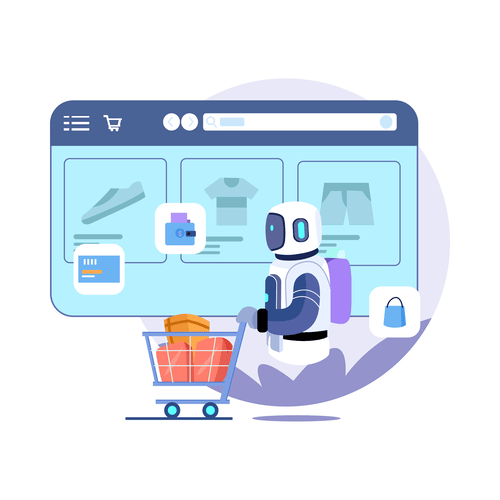Artificial intelligence in ecommerce is making it to every tech conversation today & pretty certainly, there’s some solid reason behind that! So, in this article we have compiled the present impact that AI and ecommerce bring joining hands & glimpse of how the future looks like.
Individually, the advantages of artificial intelligence development services and benefits of custom ecommerce software need no introduction. But with so much buzz around the infusion of artificial intelligence in ecommerce, there’s a major curiosity around its why, how, for how long and all the possible Wh questions!
As a technology, AI has already made it to the global urban households, redefining convenience in daily lives, years back. Even though many may still perceive AI to be related to a full-sized functional robot, the truth is, that ‘face recognition’ feature we use to unlock our smartphones to the custom playlist Spotify curates for you to the ‘you may also like’ products Amazon show to you, its AI making all of that (and a lot more) possible.
Coming to the ecommerce context, even the insiders think AI capabilities are limited to recommendation engines & e-store optimization, whereas its not even an arc of the full circle potential of AI in ecommerce. Only a few think of exploring the iceberg beyond its tip and I’m glad you’re here to the goldmine that will surely answer all your questions! In case you’re willing to share your business needs & pain points and get a tailored consultation from BinaryFolks seasoned AI & ecommerce experts,
Why Does eCommerce Need AI?
Let’s put it in the simplest of words, AI in e commerce doesn’t do anything that’s humanly impossible, rather it does what a human can do, under humanly impossible time, with machine’s accuracy & precision.
Be it digging through humongous loads of data generated by day-to-day business operations, comprehending the details from the visual world, detecting unusual system behavior or anomalies in the processes, identifying repeating patterns & self-learning response modifications on the go, AI abilities score way higher than the manual capabilities in terms of speed and quality. Plus, talking about the major aspect of ecommerce i.e. customer servicing, which is best provided 24*7 to be considered ‘good enough’. Unlike your human resources that practically can’t attend to customer queries round the clock, and need multiple breaks in between working hours, AI functions every second of the day. That’s not all. There’s a LOT more! Ahead goes all the details of AI integration across your ecommerce workflow to optimize your business side of efforts as well as customers’ experience.
10 Ways Artificial Intelligence Is Transforming E-Commerce
Use cases of AI in eCommerce are diversified over a range of striking use cases. Here’s a list of top 10 to get you started!

1. Create Intuitive Search
If you go to 10 people randomly and ask what’s their biggest turn off when they dig through an ecommerce site, I bet, at least 6 of them will say a misplaced search icon tucked somewhere the eyes generally don’t brush through, a search that pulls up absolutely irrelevant stuff (yes, I’ve found buckwheat flour while searching for ‘buckle belt’!), or something else regarding a ‘search’ functionality that doesn’t function as per expectation. We all have been there, faced that at some point, right?
Well that makes for a classic use case for AI in e commerce as with NLP & computer vision, it’s easier to add in contextualization & increase the degree of relevance for customer search results, comprehending searches of a varied kind, text, images, even videos! The question here might be, technically how does AI do it? By simply executing ML-driven auto-tagging functionality, followed by sequencing the results from ‘closest’ to ‘somewhat close’ match for text queries and by putting labels on features & functionalities captured in the visual search input.
Pinterest Chrome Extension allowing users to select & element from a pin to getting similar products displayed on feed through image recognition is a great example of bringing in intuitive search functionality to please the users.

2. Identify Appropriate Potential Prospects
The current market competition has left the businesses hungry for more customers to thrive & stay in the game. But random prospecting is surely not the way to achieve more sales, it’s just a way to make sure your sales team is at ‘some’ activity without any ROI in place. The definition of ‘good’ prospecting is simple – listing out companies & relevant team members from the business whom your offerings can cater to, purposefully. Quite evidently, a human or even a team of human resources can certainly execute such good prospecting, but the volume will leave the management thinking “couldn’t we do more prospecting, so we reach out to more relevant people?”
Let’s put it straight – human capabilities have limitations and that implies, you can either get ‘quality’ prospects or a ‘long’ list of prospects, never both only with manual efforts. That’s the problem that AI entering in the ecommerce space solves, by generating a quality prospect list matching your business’ buyer’s persona, so your brand voice reaches to the relevant base, ensuring better business opportunities. Additionally, if implemented thoughtfully, AI technologies can provide you with the buyer’s intent functionality as well. Which means, the ones from the prospect list at hand have been searching for similar services over the internet or consuming content that’s related to your offerings. However, the ready-to-use AI prospecting tools will disappoint you with its results, as the take in account generic ICPs, curated from an overall common buyers’ persona list of similar service providers segmented together. In case you’re giving a thought to reaping the highest benefit of AI in prospecting, custom is the foolproof way to go. Or simply start with a
No Cost eCommerce Intelligence Consultation

3. Auto-Optimize Sales Process On-the-Go
Flyers & cold calling are things from the past. No decision maker today has any time at all to spend some minutes over a salesy ‘How are you doing today?’ followed immediately by ‘I am this from that company..’.
So, the contemporary sales hack broadly is to slip in where the target consumers are spending most of their time and make the encounter look like ‘functional counterparts meeting by chance’ rather than a scripted sales conversation. Now, first things first, where are the target eyes mostly alert? Quite a no-brainer, the social media platforms, as reportedly 59.9% of the total global population are actively spending time there! But the real question is, how to make sure you show up your brand’s face to them exactly when they are active? While it’s pretty difficult to manually reach out to them considering varied timezones & thus varied online activity timing.
When embedded, AI in e commerce ensures timely scheduling of your outreach. Alongside, driven by natural language processing (NLP) & natural language learning (NLL), the AI engine also customizes the messaging as per target lead’s language, using keywords from your offerings which are relevant. That’s not all, using deep learning, you can take the AI capabilities to the next level by enabling self-learning on-the-go, thus improving your sales volume with a tailored outreach approach.

4. Customer Retarget & Relevant Recommendation
There’s one thing that every business agrees on – while hunting for new prospects is an essential part of the sales activity, so is following up with the pre-qualified ones. However, with manual efforts, it gets extremely tedious to keep track of such follow-ups which require close attention according to the status of the last conversation. In such case, ecom insiders often end up thinking, “Only if we could read the customers’ minds, so we could plan our marketing accordingly!” However, like a bunch of other problems that the technological advancements have solved over the years, such customer retarget dreams are brought to reality, too.
Especially since the inception of AI in ecommerce, gathering & analyzing a potential customer’s behavior across your business’ digital presence has become a cakewalk. From tracking their active dwell time, active scrolling time, idle minutes to the products they eyed, you get all this information & more. Furthermore, based on your custom marketing plans, the AI engine can help you convert the lead to a customer by offering them a custom discount on the product they showed interest in.

5. Cross-Device Compatible Chatbot-Driven Personalized Interactions
Chatbots are not a ‘new’ thing anymore. But, AI-driven chatbots disrupting the ecommerce landscape surely are a goldmine yet to be widely explored.With ever-evolving consumer preferences, one size fits all marketing strategies went obsolete. Not just that, segmented marketing isn’t the latest thing too, as individual customer-oriented personalisation is the contemporary key to success. The hack to ace focused personalization is by modifying each touch point across the sales cadence, influencing their purchase decision.
On that note, it’s an easy guess that manually digging through each buyer’s past purchase or online activity profile, and then molding the messages according to that is a nut better kept uncracked. That’s exactly where AI-driven chatbots bring in conversational commerce, and through in-depth analysis of customer data combined with its cognitive power, curates & executes a compelling sales outreach process. Besides, with cross-device compatibility & the human touch in messaging, chatbots boost engagement in your online space too.

6. Fake Review Filtration & Counterfeit Product Identification
The downside of welcoming reviews from customers is that it also enables your competitors to shower in negative reviews to harm your reputation. Considering the stats stating how a single negative review can drive away 22% of sales and three of such can curb sales by a striking 59%, it becomes a necessity to pay close attention to strategize a solid combat mechanism against such fake negative reviews.
AI goes deep across the roots of this problem, and successfully sifts out the false reviews from genuine ones, ensuring you lose no customer in the process. How exactly does this filtration work? Technically, astroturfing, the term referring to creating a fake review that looks neutral & as a result deceives a genuine customer, is a contemporary threat across marketplaces. Amazon, too, is a victim of such false reviews that take away authentic sellers’ revenue. A custom AI engine built around your business workflow can effectively minimize astroturfing through a strong verification process run before an user is allowed to publish a review.
Machine learning algorithms put in ecommerce workflow can categorize the customer’s purchase behavior over the site to label the reviews at a scale of reliability.
Additionally, AI ecommerce engines can also re-sequence reviews on-the-go based on their score on ‘helpful’ markings. This entire process, starting from review scrutiny up till post-publish check-up runs continuously to guarantee that no fake review makes it up to your website that’ll negatively impact your customers’ trust.
Similar process, just with a little tweak in the subject, replacing ‘reviews’ with ‘products’, can help you handpick counterfeit products from a pool of legitimate products. This way, you can ensure your marketplace is safeguarded against fake products taking a toll on your users’ purchase experience, consistently.

7. Virtual Personal Shoppers & Smart Negotiators
This tech evolution over the years has not just impacted the business world, but has significantly improved daily lifestyle across global households too and there’s never enough of ‘convenience’, courtesy the uphill advancements. That means, the more convenience you can bring to your customers, the higher would be your chances of sale. AI technologies are the sculpting hands that make it possible for your business to ease your customers’ lives, making their wishes its command! Fascinating enough? There’s more to it. AI doesn’t just do so to ensure your customers reap all the benefits, it prioritizes your business side of concerns, too. Simply by taking up a good fat manual human resource needs, and executing the tasks faster, with higher precision & accuracy and almost no error! Here’s how :
A virtual assistant simplifies the users’ mobile shopping experience eliminating the needs to navigate across the site. The e-assistant takes your requirement as input, fetches matching product / service recommendations, relevant deals & discounts and reviews to help you make the right purchase, hassle-free.
A virtual agent or smart negotiator, a modern CFO’s best bet, primarily identifies potential buyers and maps to the sellers, facilitates transactions and finally, maintains institutional infrastructure, while consistently meeting quotas (courtesy, no cap prospecting!).

8. Assortment Intelligence for Smart Positioning
Customers remain the king and to have the king’s attention, your pricing strategy should be as per their affordability. However, every competitor is after hitting that sweet ‘competitive pricing’, too. Assortment intelligence comes into the picture right there and helps you beat the competition, intelligently! The process of implementing assortment intelligence is simpler than the term sounds – here, the available data is used on assortment to position your business offerings in a way so it’s in sync with competitor analysis insights.
Based on the high ranking competitors product or category assortment to sales ratio, planning yours in-line with that success data as inspiration, becomes easier than ever. With such a consistent eye to product distribution & planning across the e-store, you bring the best of profitability to your business & convenience to your customers. Sounds like a competitive advantage?
.png)
9. Balance Personalization with Privacy
While trying to achieve the highest degree of personalization, businesses often end up over-invading customer privacy. Needless to say, it causes just the reverse impact – instead of making your way to more sales, you actually end up losing a customer.
So as a business there are too many balls in the air – to maintain transparency hitting the reliability factor just right, ensuring confidentiality and maintaining honesty all at once. To keep them all up & in the cycle, brands are in apressing need to attain striking personalisation without compromising on privacy factor.
The conjunction of AI and eCommerce has a way to tackle this in an easy way. The trick is to share something that’s valuable to them while you request to access & process their personal data. Quite like Google syncs with your account info to remind you of the crucial events, modified work hours due to daylight saving & more, so you don’t mind sharing your data considering the convenience it brings to your life in return.
.png)
10. Smart Inventory Management
Looking at the rapid wave of businesses swarming towards ‘smart’ inventory management, it becomes evident that there are good reasons why your business needs an AI inventory management software. That’s what makes the last (but not the least!) use case for the disruptive benefits of AI in e commerce. Let’s brief the key know-hows.
Typically, the AI-driven smart inventory management system takes in account multiple real-time data points, like warehouse location, shelf placement, product condition & its availability, status of a shipment, pace of transit etc. to ensure there’s no overstuffing or understocking the inventory. Besides, with 360° visibility across the daily operations, end-to-end inventory handling becomes easier. With the machine’s accuracy & precision put in the process there’s lesser hazards & product damage. As a result, the cost associated with the process also witnesses a significant reduction due to AI introduction and the process is carried out in a fully transparent & quality assured way.
.png)
How Artificial Intelligence in Ecommerce will Reshape the Future ?
Now you already know why AI in ecommerce is positioned as the next big thing right? Going by the steep growth graph AI has helped the digital commerce industry achieve so far, it’s no secret that the future will see monstrous growth too. That means enhanced cost benefits, fatter sales portfolio, and of course, a loyal customer base. So, the years ahead are sure to witness higher adaptation of voice enabled shopping, advanced real time autonomous data processing & response sharing, more secured fraud prevention, metaverse shopping opportunities and much more!
Conclusion
AI in ecommerce is the hotcake, which is best served with a generous amount of extensive research, paired with an offshore AI developers team who have been there & coded smart wonders multiple times!
While the above load of information may be a headful to process at once – our team of pro AI consultants & ecommerce experts can help you sail through the wave effectively!
Your AI arsenal is one step away from being loaded strategically.
Let’s plan up!




.png)